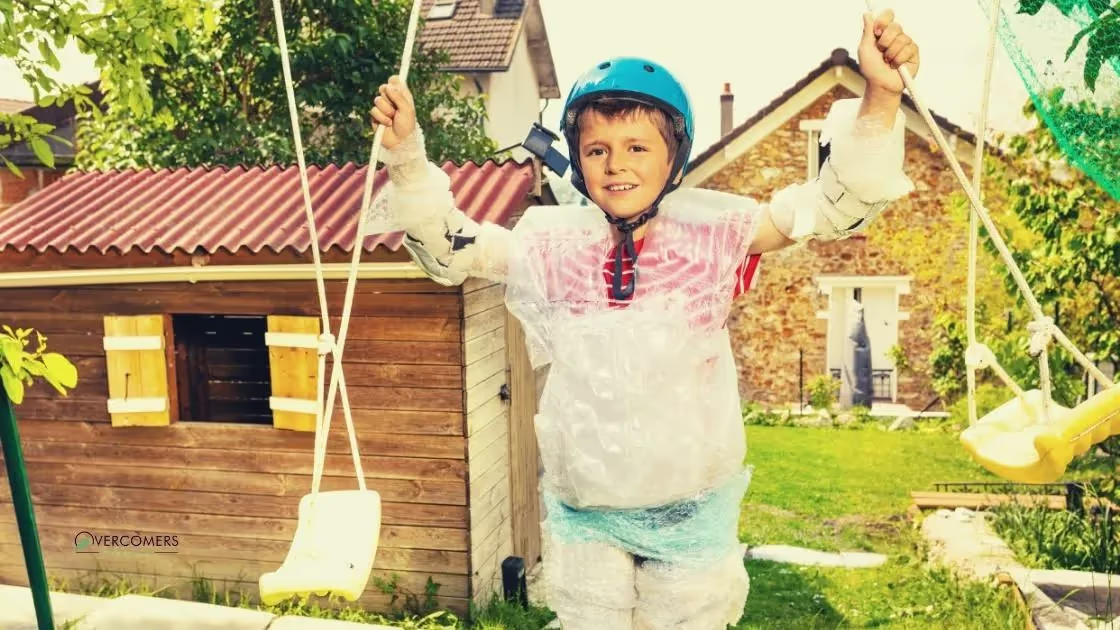There is irony in the fact that your desire to protect your child might hurt your child's future mental well-being. Support for children is essential for...

There is irony in the fact that your desire to protect your child might hurt your child's future mental well-being. Support for children is essential for children to grow, but too much support can cause stunted growth. In the delicate balance of child development, overprotective parenting can lead to unintended consequences. Many overprotective parents may find that their well-intentioned actions result in children's anxiety, dependency, and low self-esteem. Overprotective parenting styles, like helicopter parenting, can stifle a child's ability to handle life's challenges, affecting their social skills and the formation of friendships. As protective parents strive for safety, they may inadvertently limit their child's growth, leaving adult children struggling with decisions. It's crucial to consider the child's perspective and the impact of overprotective behavior measured by the parental overprotection scale, to ensure a healthy progression in the child's development.
One significant outcome of parental overprotection is the development of dependency issues in kids. This dependency manifests when children consistently rely on others to make their own decisions.
Research shows that children need opportunities to learn from their own experiences during childhood. In doing so, they develop confidence and independence, preparing them for the challenges of adulthood.
It is common for children to rely on their parents to protect them. Most parents also have powerful instincts to protect their children from harm. However, in some circumstances, parents unintentionally harm their children in the hopes of protecting their children. One of the probable consequences of overprotecting your child is exposed to anxiety risks. Overprotective parents may induce fear of the world in their children. For instance, an overprotective parent might discourage their child from trying out new sports. The anxiety can manifest when trying new things over fears of negative outcomes.
Children from overprotective parents might also worry about being rejected. This might result in lacking the necessary social skills to make friends. Children with overprotective parents might become adults with anxiety about interacting with people and trying out new things. Consider how you react to your child doing new things. Try to encourage your child to be comfortable attempting new things.
Overprotective parents might seem more likely to have confident children because they usually focus on their children. The attention might prevent their children from developing themselves. Every time an overprotective parent interferes in their child's life, they are depriving their child of the opportunity for self-accomplishments. Typically, children usually struggle at some point in their development. They also progress and eventually pass their struggles; passing their challenge would give them belief in themselves. Children with overprotective parents might not have the opportunity to build their confidence. Although well intended, overprotective parents typically dismiss their children's feelings. When they ignore their child's input in the interest of making the best decisions, they make their child question their input.
This might cause a child's self-esteem to deteriorate. One of the long-term consequences of overprotecting your child is that it might lead your child to shy away from goals, opportunities, and challenges. It would help your child gain confidence and grow in self-esteem to solve their problems. You can chip in with minimal assistance, encouragement, and praise when your child passes the challenge.

Overprotective parents' objective is to remove setbacks from their child's life. This indirectly deprives your child of valuable lessons gained from making decisions, making mistakes, failing, and learning. One of the valuable lessons your child might miss out on is risk-taking. Children with overprotective parents tend to be on two extreme sides, either averse to risk-taking or overindulgent in risk-taking. You are depriving your child of the value of experience from risk-taking at a young age. One of the consequences of overprotecting your child might be your child struggles with risk-taking. Your risk-averse child might avoid things with unknown potential. Some children will develop to another extreme of rebellion from being risk averse to taking excessive risks.
This means away from their parents; they might push risk boundaries to dangerous levels. Risk-taking skills are associated with entrepreneurs. Lacking risk-tasking puts your child at a disadvantage against other children more familiar with risk-taking. The long-term effect could range from a lifetime of missed opportunities to taking dangerous risks.
Although being bullied is never the victim's fault, it is the bully's fault. However, one of the consequences of overprotecting your child is that it puts your child at a higher chance of being bullied. Bullies usually carefully select their victims. Children with overprotective parents might struggle with social relations and confidence and appear to be targeted by their bullies. These children are also unlikely to challenge or oppose their bullies. Away from the protection of their parents, overprotected children might be unable to navigate their lives. their parents might rightly interfere against a school bully, but there will likely be other moments when overprotected children are overwhelmed by others. The major problem here is that certain people will still pick on your child when your child becomes an adult. Unfortunately, there might be no one to interfere on behalf of your child. This is why it is vital for parents to encourage and support their children.
Overprotective parenting can have profound effects on a child's psychological and social development. This style of parenting, often characterized by helicopter parents who constantly hover over their children, can lead to a range of negative outcomes. Children raised in overprotective households may become overly dependent, struggle with decision making, and find it difficult to manage life outside their comfort zone.
Moreover, research has shown that such parenting can lead to anxiety disorders, including social anxiety and panic disorder, as children feel constantly bombarded by their parents' fears and anxieties.
Addressing the effects of overprotective parenting is crucial to ensure that children are equipped with the skills and resilience to navigate the world and live independently. Encourage parents to balance their protective instincts with their child's need for independence and self-reliance. Parental anxiety with a child interaction can create issues, and in some cases cause more harm than it helps.
In spite of your best intentions, your actions can cause negative consequences to the mental well-being of your child. Try to give your child support but also give your child space. It is essential to note the consequences of overprotecting your child: dependency issues, anxiety issues, low self-esteem and confidence, risk-taking problems, and a higher chance of being bullied.
https://www.bustle.com/p/the-long-term-effects-overprotective-parents-have-on-us-62249
https://www.youniversetherapy.com/post/8-negative-effects-of-overprotective-parenting
https://www.healthline.com/health/parenting/overprotective-parents#tips
https://wehavekids.com/parenting/Children-of-Overprotective-Parents-Are-Slated-For-Failure
Help your child by providing support and guidance, using positive language, highlighting the progress they have made, breaking down the challenge into smaller steps, and motivating them with positive affirmations.